Economics Assignment: Critical Review of Demand, Supply, Equilibrium
VerifiedAdded on 2023/01/16
|6
|1427
|48
Report
AI Summary
This economics report critically reviews an article from the Sydney Morning Herald discussing the economic impact of taxing sugary drinks in Australia. The report delves into microeconomic concepts such as demand, supply, equilibrium, and negative externalities, specifically focusing on how a tax on sugary drinks could influence consumer behavior and market outcomes. It examines the law of demand, the impact of price elasticity, and the role of government intervention in addressing issues like obesity and tooth decay. The analysis includes a graphical representation of the effects of a tax on the market, highlighting the shift in supply, changes in equilibrium price and quantity, and the resulting deadweight loss. The report concludes by emphasizing the need for a multi-faceted approach, including marketing regulations and public health campaigns, to effectively tackle the problem of excessive sugar consumption.
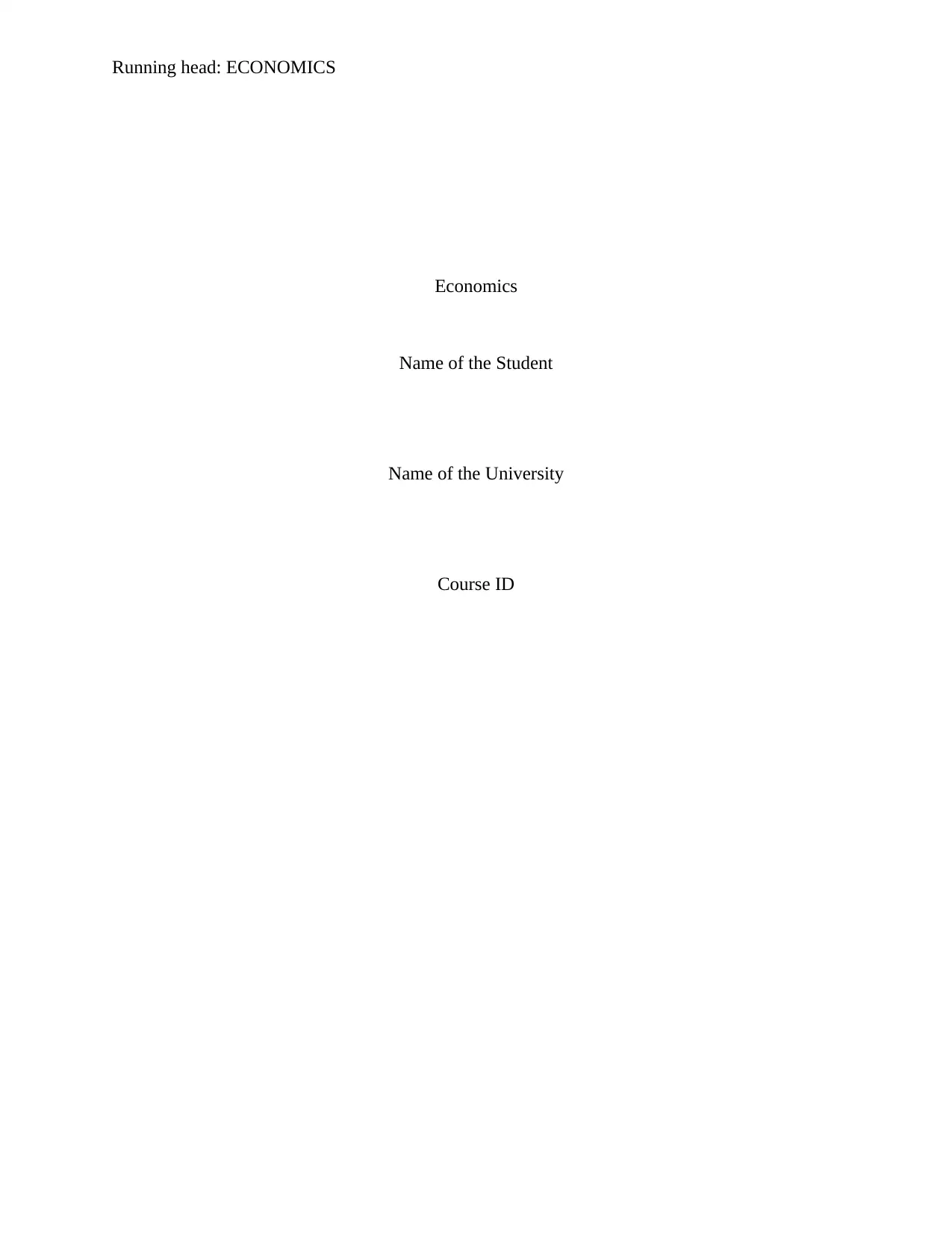
Running head: ECONOMICS
Economics
Name of the Student
Name of the University
Course ID
Economics
Name of the Student
Name of the University
Course ID
Paraphrase This Document
Need a fresh take? Get an instant paraphrase of this document with our AI Paraphraser
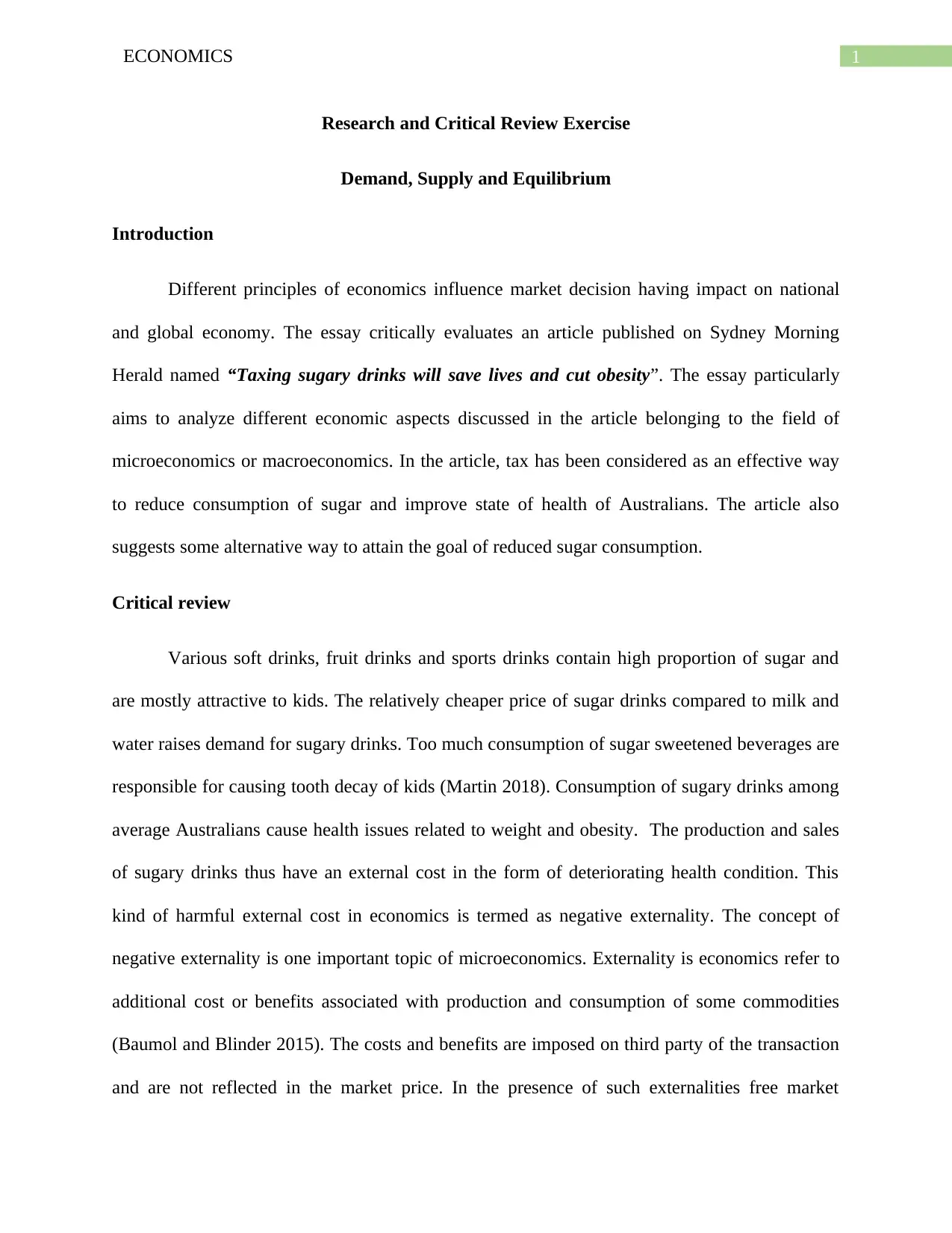
1ECONOMICS
Research and Critical Review Exercise
Demand, Supply and Equilibrium
Introduction
Different principles of economics influence market decision having impact on national
and global economy. The essay critically evaluates an article published on Sydney Morning
Herald named “Taxing sugary drinks will save lives and cut obesity”. The essay particularly
aims to analyze different economic aspects discussed in the article belonging to the field of
microeconomics or macroeconomics. In the article, tax has been considered as an effective way
to reduce consumption of sugar and improve state of health of Australians. The article also
suggests some alternative way to attain the goal of reduced sugar consumption.
Critical review
Various soft drinks, fruit drinks and sports drinks contain high proportion of sugar and
are mostly attractive to kids. The relatively cheaper price of sugar drinks compared to milk and
water raises demand for sugary drinks. Too much consumption of sugar sweetened beverages are
responsible for causing tooth decay of kids (Martin 2018). Consumption of sugary drinks among
average Australians cause health issues related to weight and obesity. The production and sales
of sugary drinks thus have an external cost in the form of deteriorating health condition. This
kind of harmful external cost in economics is termed as negative externality. The concept of
negative externality is one important topic of microeconomics. Externality is economics refer to
additional cost or benefits associated with production and consumption of some commodities
(Baumol and Blinder 2015). The costs and benefits are imposed on third party of the transaction
and are not reflected in the market price. In the presence of such externalities free market
Research and Critical Review Exercise
Demand, Supply and Equilibrium
Introduction
Different principles of economics influence market decision having impact on national
and global economy. The essay critically evaluates an article published on Sydney Morning
Herald named “Taxing sugary drinks will save lives and cut obesity”. The essay particularly
aims to analyze different economic aspects discussed in the article belonging to the field of
microeconomics or macroeconomics. In the article, tax has been considered as an effective way
to reduce consumption of sugar and improve state of health of Australians. The article also
suggests some alternative way to attain the goal of reduced sugar consumption.
Critical review
Various soft drinks, fruit drinks and sports drinks contain high proportion of sugar and
are mostly attractive to kids. The relatively cheaper price of sugar drinks compared to milk and
water raises demand for sugary drinks. Too much consumption of sugar sweetened beverages are
responsible for causing tooth decay of kids (Martin 2018). Consumption of sugary drinks among
average Australians cause health issues related to weight and obesity. The production and sales
of sugary drinks thus have an external cost in the form of deteriorating health condition. This
kind of harmful external cost in economics is termed as negative externality. The concept of
negative externality is one important topic of microeconomics. Externality is economics refer to
additional cost or benefits associated with production and consumption of some commodities
(Baumol and Blinder 2015). The costs and benefits are imposed on third party of the transaction
and are not reflected in the market price. In the presence of such externalities free market
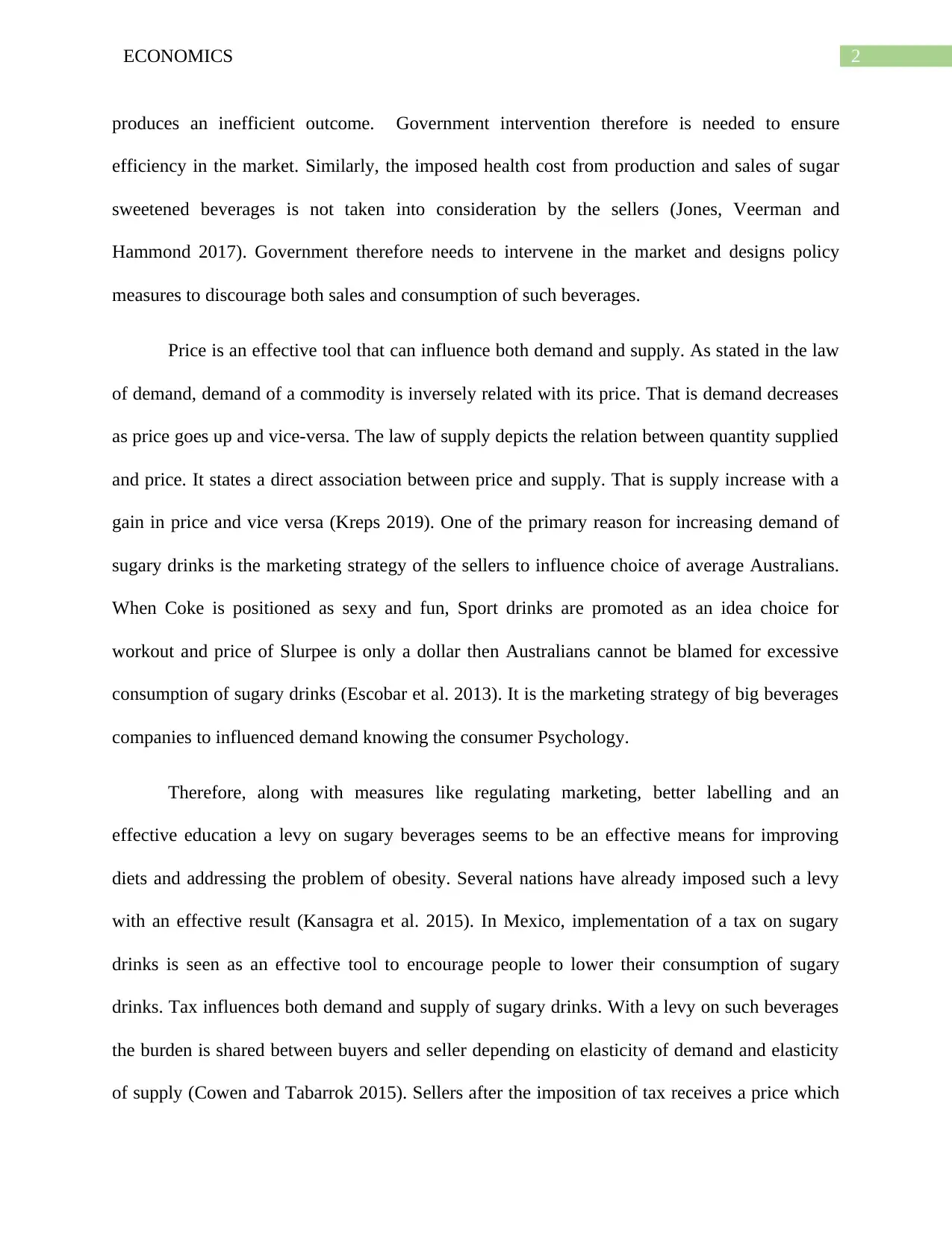
2ECONOMICS
produces an inefficient outcome. Government intervention therefore is needed to ensure
efficiency in the market. Similarly, the imposed health cost from production and sales of sugar
sweetened beverages is not taken into consideration by the sellers (Jones, Veerman and
Hammond 2017). Government therefore needs to intervene in the market and designs policy
measures to discourage both sales and consumption of such beverages.
Price is an effective tool that can influence both demand and supply. As stated in the law
of demand, demand of a commodity is inversely related with its price. That is demand decreases
as price goes up and vice-versa. The law of supply depicts the relation between quantity supplied
and price. It states a direct association between price and supply. That is supply increase with a
gain in price and vice versa (Kreps 2019). One of the primary reason for increasing demand of
sugary drinks is the marketing strategy of the sellers to influence choice of average Australians.
When Coke is positioned as sexy and fun, Sport drinks are promoted as an idea choice for
workout and price of Slurpee is only a dollar then Australians cannot be blamed for excessive
consumption of sugary drinks (Escobar et al. 2013). It is the marketing strategy of big beverages
companies to influenced demand knowing the consumer Psychology.
Therefore, along with measures like regulating marketing, better labelling and an
effective education a levy on sugary beverages seems to be an effective means for improving
diets and addressing the problem of obesity. Several nations have already imposed such a levy
with an effective result (Kansagra et al. 2015). In Mexico, implementation of a tax on sugary
drinks is seen as an effective tool to encourage people to lower their consumption of sugary
drinks. Tax influences both demand and supply of sugary drinks. With a levy on such beverages
the burden is shared between buyers and seller depending on elasticity of demand and elasticity
of supply (Cowen and Tabarrok 2015). Sellers after the imposition of tax receives a price which
produces an inefficient outcome. Government intervention therefore is needed to ensure
efficiency in the market. Similarly, the imposed health cost from production and sales of sugar
sweetened beverages is not taken into consideration by the sellers (Jones, Veerman and
Hammond 2017). Government therefore needs to intervene in the market and designs policy
measures to discourage both sales and consumption of such beverages.
Price is an effective tool that can influence both demand and supply. As stated in the law
of demand, demand of a commodity is inversely related with its price. That is demand decreases
as price goes up and vice-versa. The law of supply depicts the relation between quantity supplied
and price. It states a direct association between price and supply. That is supply increase with a
gain in price and vice versa (Kreps 2019). One of the primary reason for increasing demand of
sugary drinks is the marketing strategy of the sellers to influence choice of average Australians.
When Coke is positioned as sexy and fun, Sport drinks are promoted as an idea choice for
workout and price of Slurpee is only a dollar then Australians cannot be blamed for excessive
consumption of sugary drinks (Escobar et al. 2013). It is the marketing strategy of big beverages
companies to influenced demand knowing the consumer Psychology.
Therefore, along with measures like regulating marketing, better labelling and an
effective education a levy on sugary beverages seems to be an effective means for improving
diets and addressing the problem of obesity. Several nations have already imposed such a levy
with an effective result (Kansagra et al. 2015). In Mexico, implementation of a tax on sugary
drinks is seen as an effective tool to encourage people to lower their consumption of sugary
drinks. Tax influences both demand and supply of sugary drinks. With a levy on such beverages
the burden is shared between buyers and seller depending on elasticity of demand and elasticity
of supply (Cowen and Tabarrok 2015). Sellers after the imposition of tax receives a price which
⊘ This is a preview!⊘
Do you want full access?
Subscribe today to unlock all pages.

Trusted by 1+ million students worldwide
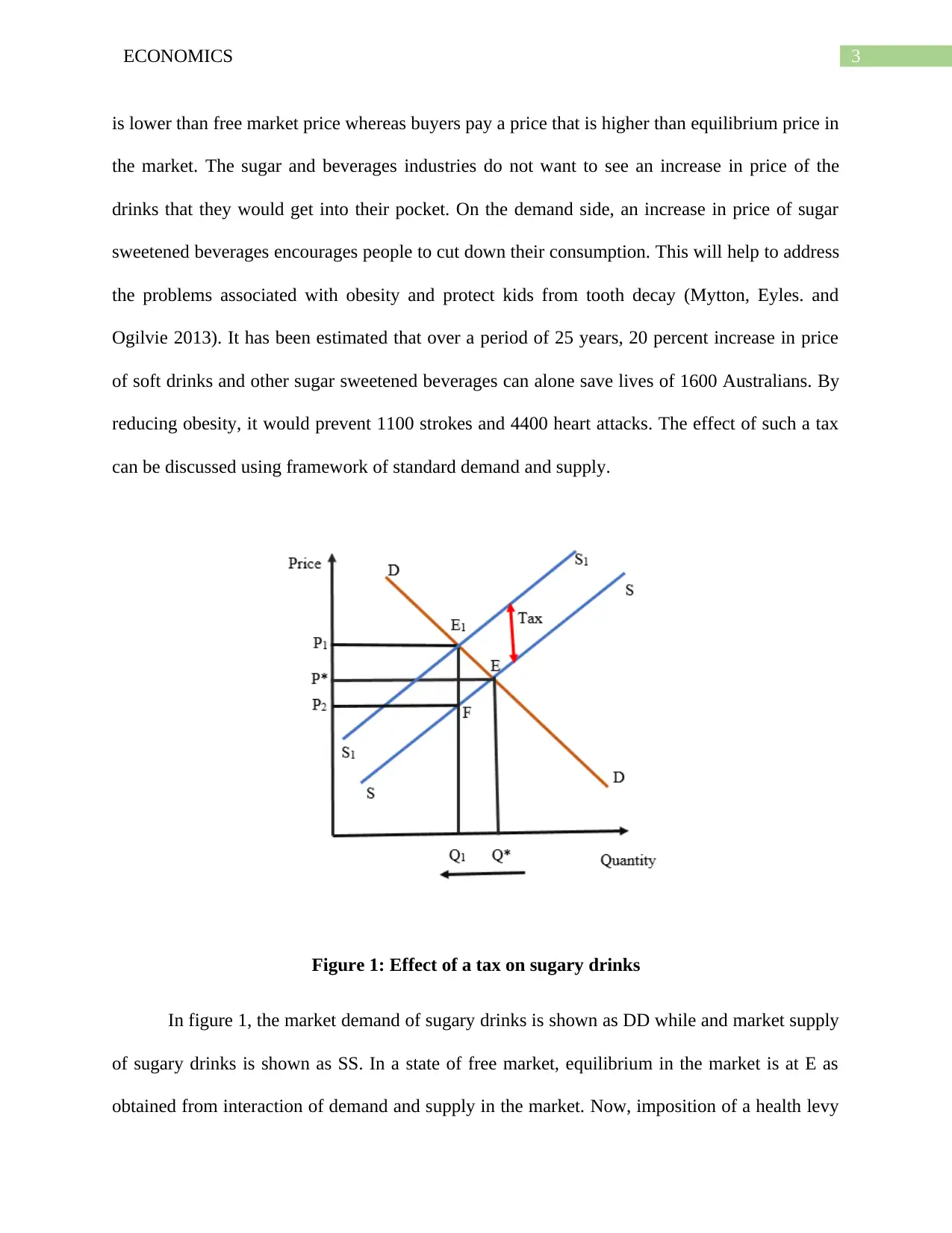
3ECONOMICS
is lower than free market price whereas buyers pay a price that is higher than equilibrium price in
the market. The sugar and beverages industries do not want to see an increase in price of the
drinks that they would get into their pocket. On the demand side, an increase in price of sugar
sweetened beverages encourages people to cut down their consumption. This will help to address
the problems associated with obesity and protect kids from tooth decay (Mytton, Eyles. and
Ogilvie 2013). It has been estimated that over a period of 25 years, 20 percent increase in price
of soft drinks and other sugar sweetened beverages can alone save lives of 1600 Australians. By
reducing obesity, it would prevent 1100 strokes and 4400 heart attacks. The effect of such a tax
can be discussed using framework of standard demand and supply.
Figure 1: Effect of a tax on sugary drinks
In figure 1, the market demand of sugary drinks is shown as DD while and market supply
of sugary drinks is shown as SS. In a state of free market, equilibrium in the market is at E as
obtained from interaction of demand and supply in the market. Now, imposition of a health levy
is lower than free market price whereas buyers pay a price that is higher than equilibrium price in
the market. The sugar and beverages industries do not want to see an increase in price of the
drinks that they would get into their pocket. On the demand side, an increase in price of sugar
sweetened beverages encourages people to cut down their consumption. This will help to address
the problems associated with obesity and protect kids from tooth decay (Mytton, Eyles. and
Ogilvie 2013). It has been estimated that over a period of 25 years, 20 percent increase in price
of soft drinks and other sugar sweetened beverages can alone save lives of 1600 Australians. By
reducing obesity, it would prevent 1100 strokes and 4400 heart attacks. The effect of such a tax
can be discussed using framework of standard demand and supply.
Figure 1: Effect of a tax on sugary drinks
In figure 1, the market demand of sugary drinks is shown as DD while and market supply
of sugary drinks is shown as SS. In a state of free market, equilibrium in the market is at E as
obtained from interaction of demand and supply in the market. Now, imposition of a health levy
Paraphrase This Document
Need a fresh take? Get an instant paraphrase of this document with our AI Paraphraser
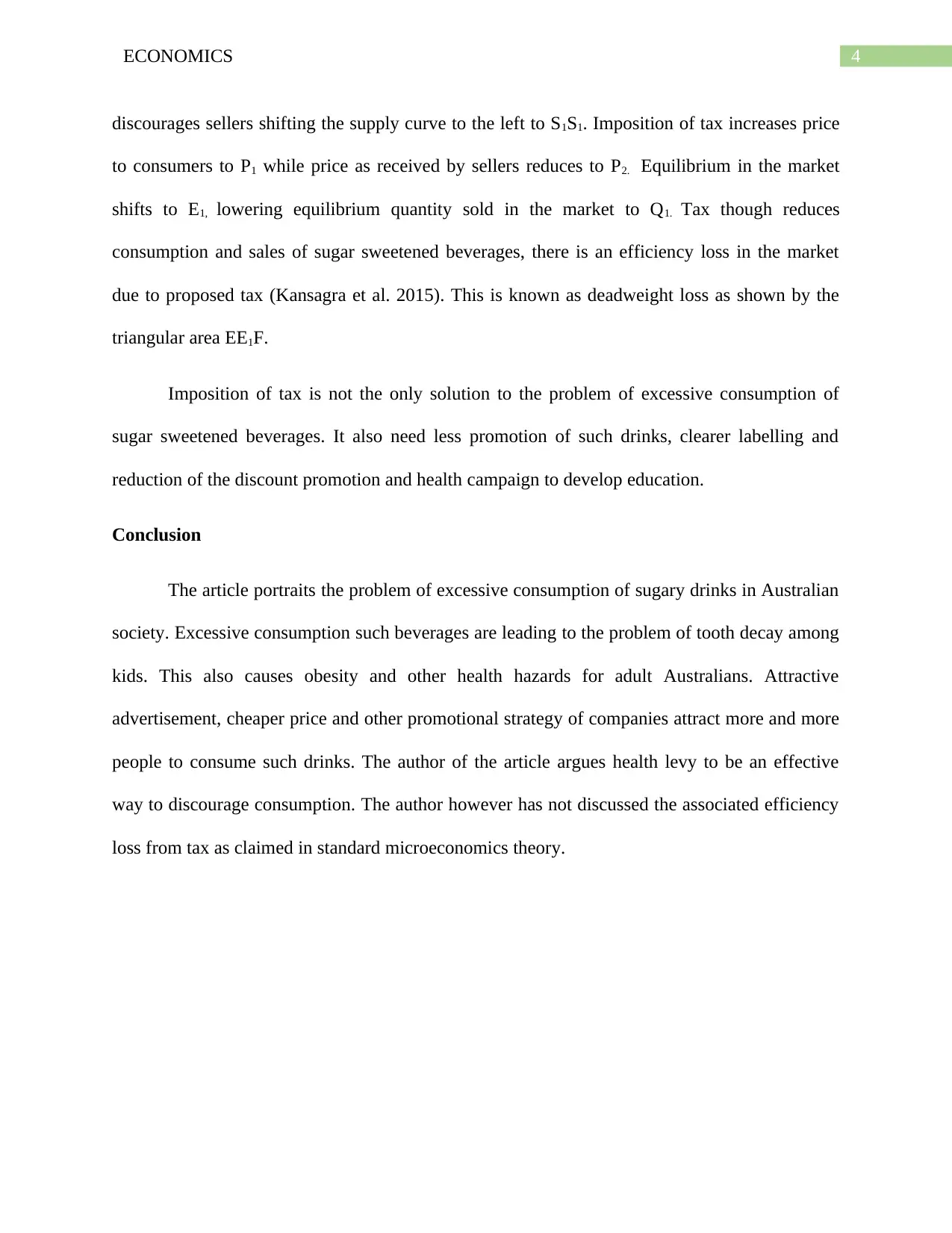
4ECONOMICS
discourages sellers shifting the supply curve to the left to S1S1. Imposition of tax increases price
to consumers to P1 while price as received by sellers reduces to P2. Equilibrium in the market
shifts to E1, lowering equilibrium quantity sold in the market to Q1. Tax though reduces
consumption and sales of sugar sweetened beverages, there is an efficiency loss in the market
due to proposed tax (Kansagra et al. 2015). This is known as deadweight loss as shown by the
triangular area EE1F.
Imposition of tax is not the only solution to the problem of excessive consumption of
sugar sweetened beverages. It also need less promotion of such drinks, clearer labelling and
reduction of the discount promotion and health campaign to develop education.
Conclusion
The article portraits the problem of excessive consumption of sugary drinks in Australian
society. Excessive consumption such beverages are leading to the problem of tooth decay among
kids. This also causes obesity and other health hazards for adult Australians. Attractive
advertisement, cheaper price and other promotional strategy of companies attract more and more
people to consume such drinks. The author of the article argues health levy to be an effective
way to discourage consumption. The author however has not discussed the associated efficiency
loss from tax as claimed in standard microeconomics theory.
discourages sellers shifting the supply curve to the left to S1S1. Imposition of tax increases price
to consumers to P1 while price as received by sellers reduces to P2. Equilibrium in the market
shifts to E1, lowering equilibrium quantity sold in the market to Q1. Tax though reduces
consumption and sales of sugar sweetened beverages, there is an efficiency loss in the market
due to proposed tax (Kansagra et al. 2015). This is known as deadweight loss as shown by the
triangular area EE1F.
Imposition of tax is not the only solution to the problem of excessive consumption of
sugar sweetened beverages. It also need less promotion of such drinks, clearer labelling and
reduction of the discount promotion and health campaign to develop education.
Conclusion
The article portraits the problem of excessive consumption of sugary drinks in Australian
society. Excessive consumption such beverages are leading to the problem of tooth decay among
kids. This also causes obesity and other health hazards for adult Australians. Attractive
advertisement, cheaper price and other promotional strategy of companies attract more and more
people to consume such drinks. The author of the article argues health levy to be an effective
way to discourage consumption. The author however has not discussed the associated efficiency
loss from tax as claimed in standard microeconomics theory.
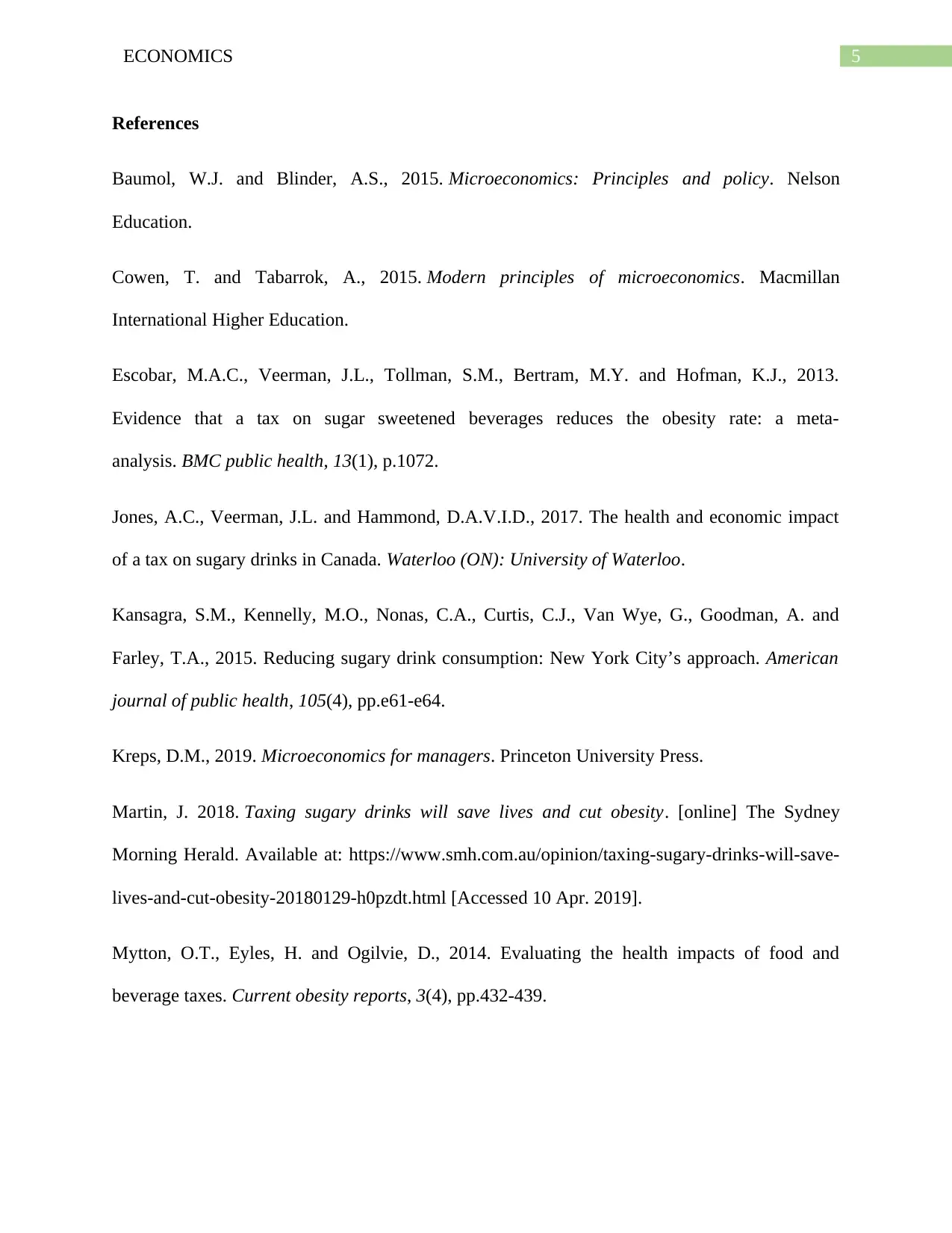
5ECONOMICS
References
Baumol, W.J. and Blinder, A.S., 2015. Microeconomics: Principles and policy. Nelson
Education.
Cowen, T. and Tabarrok, A., 2015. Modern principles of microeconomics. Macmillan
International Higher Education.
Escobar, M.A.C., Veerman, J.L., Tollman, S.M., Bertram, M.Y. and Hofman, K.J., 2013.
Evidence that a tax on sugar sweetened beverages reduces the obesity rate: a meta-
analysis. BMC public health, 13(1), p.1072.
Jones, A.C., Veerman, J.L. and Hammond, D.A.V.I.D., 2017. The health and economic impact
of a tax on sugary drinks in Canada. Waterloo (ON): University of Waterloo.
Kansagra, S.M., Kennelly, M.O., Nonas, C.A., Curtis, C.J., Van Wye, G., Goodman, A. and
Farley, T.A., 2015. Reducing sugary drink consumption: New York City’s approach. American
journal of public health, 105(4), pp.e61-e64.
Kreps, D.M., 2019. Microeconomics for managers. Princeton University Press.
Martin, J. 2018. Taxing sugary drinks will save lives and cut obesity. [online] The Sydney
Morning Herald. Available at: https://www.smh.com.au/opinion/taxing-sugary-drinks-will-save-
lives-and-cut-obesity-20180129-h0pzdt.html [Accessed 10 Apr. 2019].
Mytton, O.T., Eyles, H. and Ogilvie, D., 2014. Evaluating the health impacts of food and
beverage taxes. Current obesity reports, 3(4), pp.432-439.
References
Baumol, W.J. and Blinder, A.S., 2015. Microeconomics: Principles and policy. Nelson
Education.
Cowen, T. and Tabarrok, A., 2015. Modern principles of microeconomics. Macmillan
International Higher Education.
Escobar, M.A.C., Veerman, J.L., Tollman, S.M., Bertram, M.Y. and Hofman, K.J., 2013.
Evidence that a tax on sugar sweetened beverages reduces the obesity rate: a meta-
analysis. BMC public health, 13(1), p.1072.
Jones, A.C., Veerman, J.L. and Hammond, D.A.V.I.D., 2017. The health and economic impact
of a tax on sugary drinks in Canada. Waterloo (ON): University of Waterloo.
Kansagra, S.M., Kennelly, M.O., Nonas, C.A., Curtis, C.J., Van Wye, G., Goodman, A. and
Farley, T.A., 2015. Reducing sugary drink consumption: New York City’s approach. American
journal of public health, 105(4), pp.e61-e64.
Kreps, D.M., 2019. Microeconomics for managers. Princeton University Press.
Martin, J. 2018. Taxing sugary drinks will save lives and cut obesity. [online] The Sydney
Morning Herald. Available at: https://www.smh.com.au/opinion/taxing-sugary-drinks-will-save-
lives-and-cut-obesity-20180129-h0pzdt.html [Accessed 10 Apr. 2019].
Mytton, O.T., Eyles, H. and Ogilvie, D., 2014. Evaluating the health impacts of food and
beverage taxes. Current obesity reports, 3(4), pp.432-439.
⊘ This is a preview!⊘
Do you want full access?
Subscribe today to unlock all pages.

Trusted by 1+ million students worldwide
1 out of 6
Related Documents
Your All-in-One AI-Powered Toolkit for Academic Success.
+13062052269
info@desklib.com
Available 24*7 on WhatsApp / Email
![[object Object]](/_next/static/media/star-bottom.7253800d.svg)
Unlock your academic potential
Copyright © 2020–2026 A2Z Services. All Rights Reserved. Developed and managed by ZUCOL.





